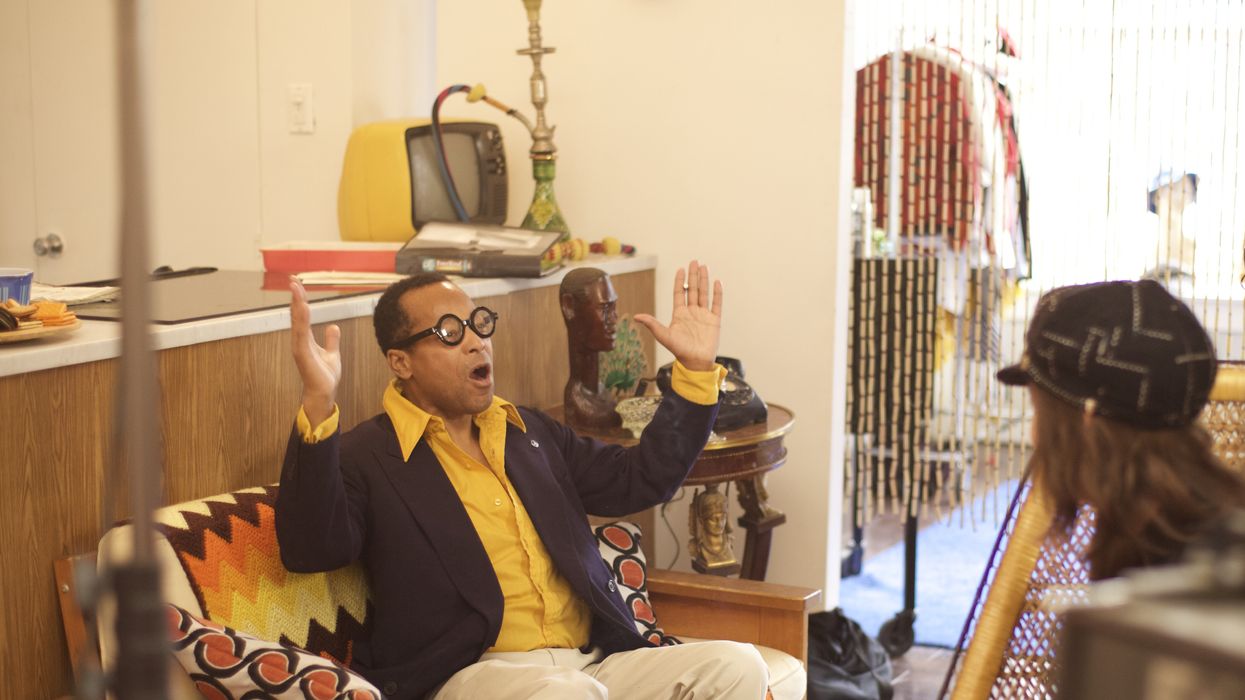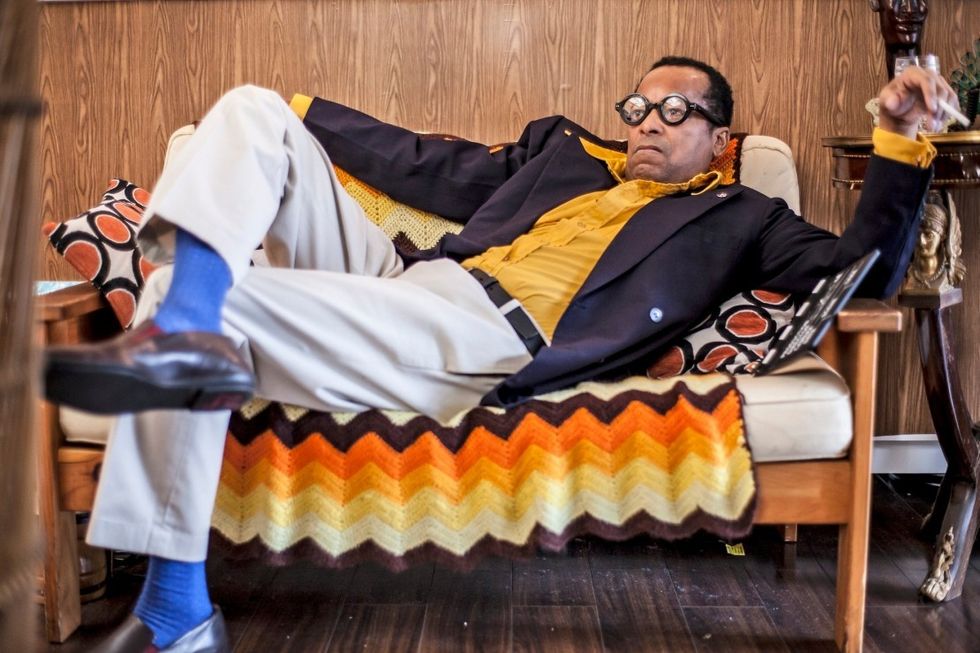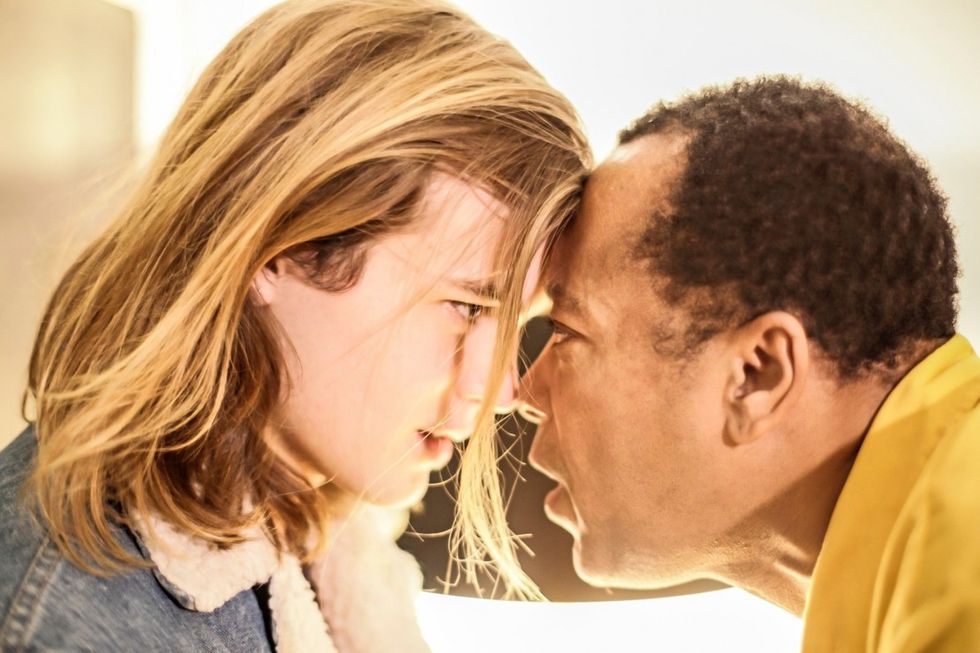How Stephen Winter Used Super-VHS to Uncover the Nature of Truth
Stephen Winter ingeniously captures the birth of the independent documentary in 'Jason and Shirley.'

[Editor's Note: No Film School sent Scout Tafoya to cover the 5th annual BlackStar Film Festival in Philadelphia.]
One of the impressive picks at this year's BlackStar Film Festival was Stephen Winter's film Jason and Shirley. It's a narrative about one of the most important documentaries of all time: Shirley Clarke's Portrait of Jason(1967), which concerns a hustler telling his life story over the course of one long night. It's an electrifying portrait of blackness, homosexuality, and of personalities on loan to whomever needs them. The hustler Jason is as much in thrall to Shirley Clarke and her camera as he is to the partners he recounts his experiences with during the original film.
Portrait of Jason is a deeply compelling work, still waiting for its acceptance as a classic by the mainstream. Winter's film Jason and Shirley is an incredibly important step towards Portrait of Jason being understood and absorbed by a largely bigoted cultural authority. Known for his impressive track record as a producer, writer, and director, Jason and Shirley is Winter's first feature film in over a decade. No Film School spoke to him about the ambitious project and the collaborative effort behind it.
NFS: Tell us about the filmmaking process, from inception to the premiere at BlackStar.
Winter: The most important part of the process was that it was a community-founded project created by a group of friends. My two co-stars and co-writers Jack Waters and Sarah Schulman have been friends for decades, and we’ve all been good comrades over the years. Every actor was a friend or family member. Most of the crew were friends or friends or friends and all the key department heads—production design, costumes, music, cinematography, editing—all friends.
On top of all that friendship was a story we all believed in because we knew it was something that had never been told before and we had to seize the day and get it done. We all knew Sarah would be a brilliant collaborator and Jack’s performance as “Jason” would be singularly unbelievable.
"You can’t ask friends to give up two weeks to work for low pay or no pay for your feature film, but you can ask them to spend a long weekend making magic with you."
NFS: So you had your crew, your family, what next?
Winter: To maximize all this goodwill and hard work, I made sure to write a story that could feasibly be filmed in one location over one long weekend. You can’t ask friends to give up two weeks to work for low pay or no pay for your feature film, but you can ask them to spend a long weekend making magic with you.
A word about friendships between artists, especially filmmakers: they are important to create and maintain but always in a patient, sincere and forthright way. Before any filmmaker-to-filmmaker relationship begins, there will be a spark of attraction of some sort, be it creative, emotional, physical, or all three. That will usually lead to an acquaintance. In the process of becoming acquainted, you watch each other’s work, you meet the other’s pals or share overlapping colleagues, you learn about each other’s lives, you support each other’s efforts, you learn about each other. If you like what you learn, you become friends. During the course of your friendship, you share experiences with each other, highs, lows and everyday stuff. You learn about each other. That leads to a deeper trust and comradeship, which can lead to deciding to collaborate on something. Collaborators get “married” to each other with the project as their “baby.” So choose your moments to get hitched wisely.
There is no time limit to growing a working relationship and friendship. It could take a week or it could take years, but each level of trust-making is equally important. Nothing should be skipped or rushed. It’s like building a house; lay a strong foundation if you don’t want it to fall down at the first sign of a storm. Jason and Shirley would never have been conceived, executed, or brought into the theaters without the strength of friendship.

NFS: How did you decide upon the visual language of the film?
Winter: The theme of Jason and Shirley is the nature of truth. Our sensibility was about evoking memories, and our setting was New York in 1966, which meant we couldn’t use digital cameras to make you believe you were there. Super-VHS was the only way to really bring all that across. Its an antiquated format that can result in beautiful images that are unpredictable and almost spiritual. Of course, it was rolling the dice because there’s no playback monitor so you don’t know what you’re getting until you look at it. But that’s the way it was with 16mm film, so it made our production development and execution feel more urgent, in the best possible way. Everyone was excited to take a chance and make it more old-school.
Super-VHS is an antiquated format that can result in beautiful images that are unpredictable and almost spiritual.
NFS: What do you think the next five years of producing will look like on the independent level? Are you optimistic about more black stories being greenlit?
Winter: What I am truly optimistic about is the level of talent you see emerging every year. There are some incredible new black cinematic voices all the time and they are figuring out how to get their work made and into the system. If we can figure out better ways to increase distribution opportunities and finishing funds for black films we’ll be doing okay. But the best and worst thing about thinking of film as an industry over the next 5 years is the old William Goldman line, “Nobody knows anything.”

NFS: When you look back at independent cinema by folks like Shirley Clarke, what does it make you feel about the way we treat artists? Are you optimistic that we'll treating artists better going forward?
Winter: I think the biggest key to the future is for us artists ourselves treating ourselves well. We should support each other, congratulate each other, and be sure we are eating well and staying healthy. This is no job for tenderfoots, so get happy and stay tough.
NFS: What would you say to young filmmakers just starting out?
Winter: One, design each take as if it’s the only thing you want to see, then shoot extra for coverage. Two, if you don't have it on set it will not magically appear in the edit room. Three, performance is everything.










![Ethos, Pathos, Logos: 20 Effective Ways to Advertise [Infographic]](https://nofilmschool.com/media-library/ethos-pathos-logos-20-effective-ways-to-advertise-infographic.jpg?id=34064614&width=600&height=600&quality=90&coordinates=560%2C0%2C0%2C0)

